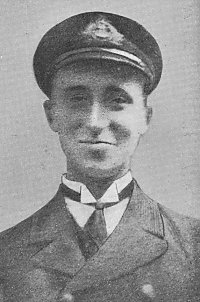
SAMUEL ROBERT VICTOR SELF
It is almost a tradition that the sons of men who served in the Royal Navy should go on to do so themselves, in some instances even following the same trade, as was the case of Samuel Robert and his father Lionel Self who were both engineers.
Lionel was born some way from the sea at Gower Street in the centre of London in 1857. His parents were Edwin (a draper) and Ann Self who moved their family out to Chertsey shortly after Lionel was born. There they remained for much of Lionel's early life which later included qualifying as an Engine Fitter and Draughtsman. He married Mary Elizabeth Duddle in Wigan in 1878 and was still resident there when the 1881 census was taken.
Lionel and Mary had their first child, Lilley whilst at Wigan but shortly afterwards Lionel decided to join the Royal Navy which brought the family to Portsmouth. Whilst qualifying as an Engine Room Artificer Lionel found a home for his expanding family at 52 Sutherland Road, off Jessie Road in Southsea. By the time of the census in 1891 four more children had arrived - Rose (b. 1884), Edwin (b. 1886), James (b. 1888) and Samuel Robert Victor (b.1890).

The family were not present in England for the 1901 census but must have returned the following year as Samuel Robert began attending the Higher Grade School on Victoria Road North in 1902. He stayed there until 1904, a period which encompassed the school's transition to Secondary status.
Samuel Robert passed into the Royal Navy as a Boy Artificer in 1904. On the training ship, H.M.S. Fisgard, he was awarded the First Prize in the years 1905-06. Meanwhile, though he was at sea for the 1911 census, we know that his parents had moved to 129 Festing Grove which was probably seen as a more fitting address for Lionel's then rank of Lieutenant Commander.
'On the outbreak of the Great War Samuel Robert was serving in H.M. Destroyer Firedrake and was present at the Battle of Heligoland Bight. He afterwards served in H.M.S. Neptune, where he was promoted to Mate Engineer. Leaving that ship to join H.M.S. Invincible, he met his death when this vessel was sunk in the Battle of Jutland. Eyewitnesses describe the great enthusiasm aroused by the glorious rush of the Invincible into the battle amidst the cheers of the other battle cruisers. This ship was only half an hour in the fight and then blew up, all but the Commander and five men being killed instantly. The ship went down in ten seconds.'
His Commander wrote of him:- "He was a popular officer in the wardroom and an excellent messmate. The Engineer-Commander had also a high appreciation of his professional abilities." The Chaplain of H.M.S. Neptune wrote:- "Everyone formed a very high opinion of him. We all liked him very much and we all feel that the service has lost a keen and promising officer."
FURTHER INFORMATION
The photograph above was taken from a WW1 memorial booklet published by Southern Grammar School. Extracts also appear above.
The Commonwealth War Graves Commission (CWGC) lists Mate Samuel Robert Victor Self, Engineer, Royal Navy, HMS Invincible, died on 31/05/1916, aged 26. Remembered on the Portsmouth Naval Memorial (Panel 11). Son of Engr. Lieut. Comdr. Lionel Self (Retired), and Mary Elizabeth Self, of 129, Festing Grove, East Southsea.
Samuel Self is remembered on the Southern Grammar School WW1 Memorial and on the Cenotaph. He is not listed in the 'National Roll of the Great War'. His official Naval number was 271907.
Tim Backhouse
June 2014